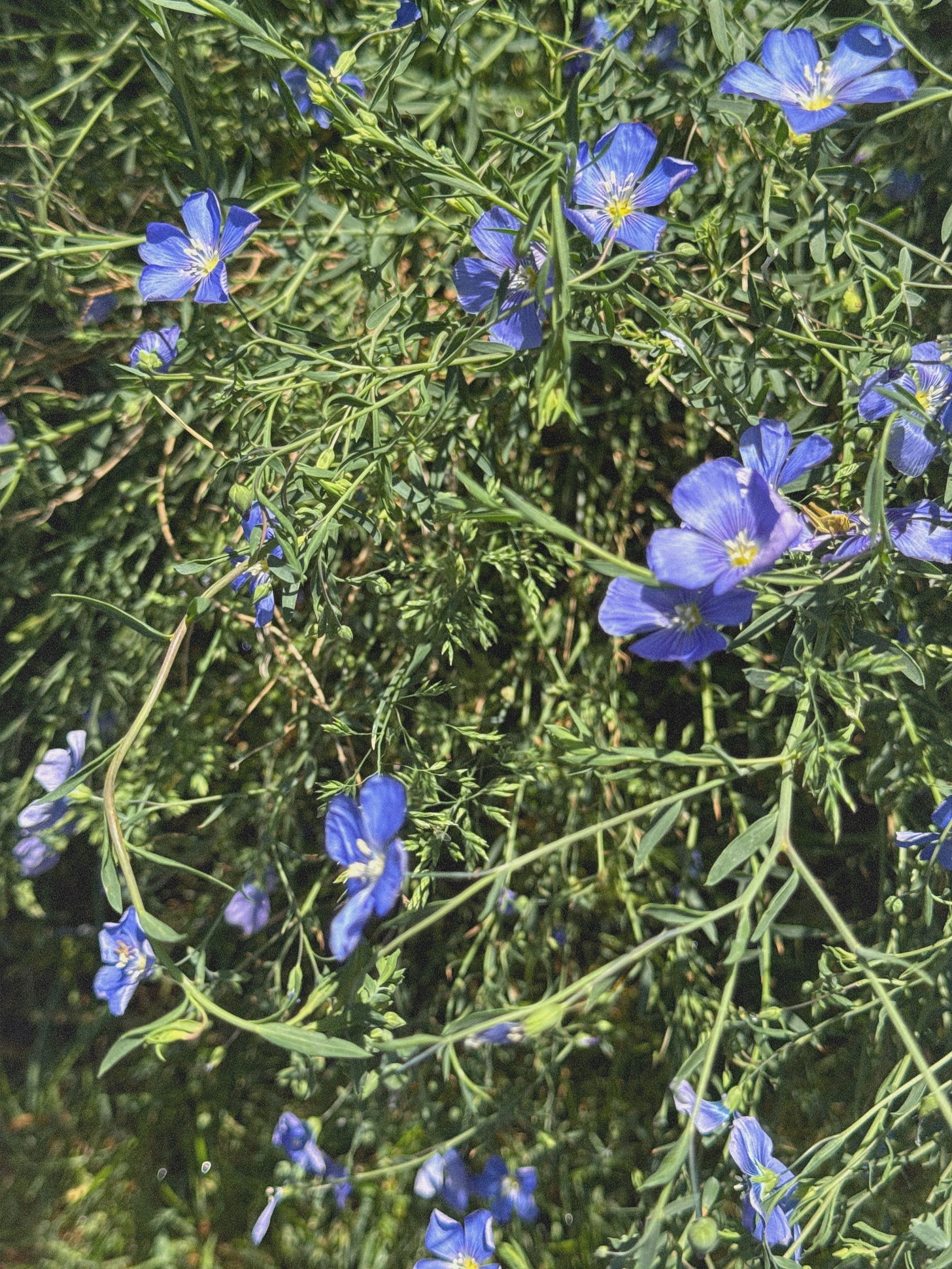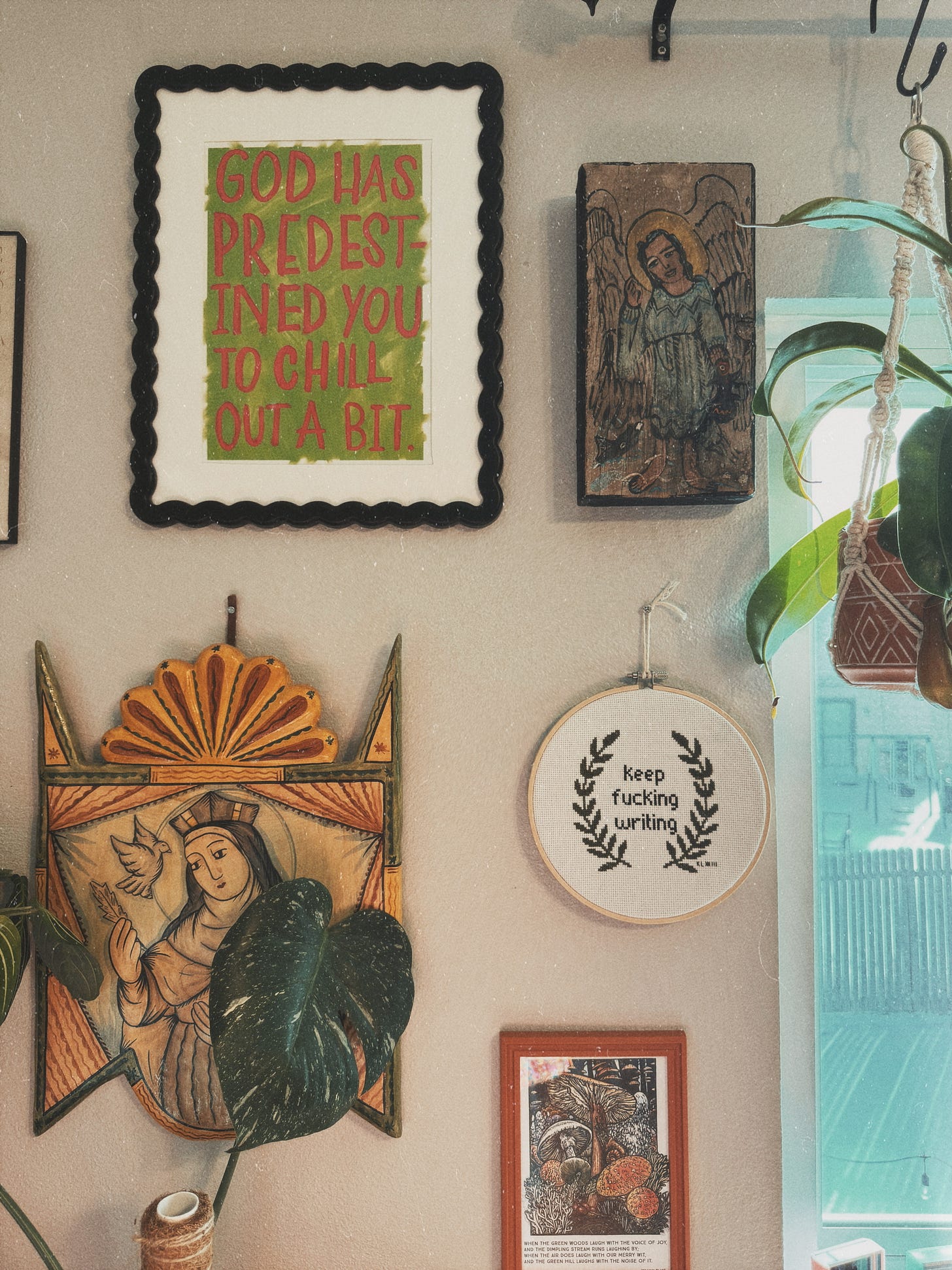When I say I’m praying for you, what I mean is I’m imagining you standing in the light of a setting sun, smile stretched across your face. I’m visualizing love like a mycelial web, threaded beneath you in joy and in sorrow, pulsing electric with kindness and strength you couldn’t create. I’m gathering up the grace that has carried me through my hardest griefs and letting it travel from my lungs to my lips, breath deep and slow, bridging the miles between us. I’m picturing the pain in my body and soul like a storm, lightning splintering energy across a giant sky, and hoping you too will face your squalls with feral awe. I’m naming the reality of evil and naming you as good. I’m saying your name aloud multiple times a day, with a huge smile, and sometimes with tears. I’m stopping to smell the lilacs, pressing my face into their soft mounded petals, willing you to pause. I’m chopping green onions and popping in a bite, blessing what is sharp as the bringer of flavor, trusting you will taste it. When I say I’m praying for you, what I mean is, I’m holding you as beloved in the hidden imagination of my heart.
Recently, a friend asked me to pray for him. And, without hesitation, I said that I would.
Even that is significant, because for a long while, I wasn’t sure I could say I’m praying for you and mean it.
I scheduled reminders in my calendar for 10am for the next 10 days, sat back, and smiled. Somewhere along the way, I’m not sure what prayer means anymore became I am participating in your wholeness. Somehow, the words I lost became a way of loving.
And in that quiet, good realization, I asked myself, “What do I mean when I say I’m praying for you?”
The words above were my immediate answer, thumbs dancing out descriptions that are usually sensed rather than said, mind and heart meeting in the middle, where prayer has become embodied.
And I decided to share it—here on Substack and on Instagram—because giving words to the wordless is the task of my soul, and having once lost language for faith, I can’t withhold the joy of being found.
It’s not that I was faithless. It’s that I fell.
Nearly two years ago I fell into a river where time bursts its banks. My body sank beneath the surface of water deep and dark, thrashed by a current stronger than self, churned in the confluence of the only river I knew and the one I hadn’t seen coming.1
Perhaps it was the place where, like the Tigris and Euphrates, time as we know it meets eternity. I still have not found a map.
I was drowning—terrified—and then flooded, not with fear but peace, capillaries charged with life I never could have conjured. When I could not breathe, lungs burning with need, breath beyond my own filled me.
Every cell in my body wanted to live, and I was conscious of that complete consent. I knew that whether I stopped breathing or continued, all would be well. I came up gasping, drenched and changed, lungs and language forever altered by the unconditional belonging that met me in the beneath.
What happened in that water unwrapped words themselves, giving me a glimpse of the with at their source. I came up humbled by that holy dark, irreversibly aware of two things:
how little we know of what we mean when we speak of the sacred
the inextricable connection and kinship between all that lives.
I fell into the water a self; I came up no longer separate.
But it has taken a long time to find my footing after falling into that mystical river. It is taking time to be both a self and inseparable.
I can’t seem to describe what happened to me—a series of near-death experiences in recurrent, severe anaphylactic shock, followed by learning to live again—except in metaphor. And that is fitting, because the Greek root words of metaphor—meta + pherein—merge to mean to carry across.2
A metaphor holds something precious so that it can be carried from one place to another. And what is more precious than our relationship to the Divine?
What can carry your relationship with Love, Hope, and Faith from the place you once were to the place you must inhabit now?
I no longer offer answers.
I came out of the water with wonder. I had been afraid of dying and then amazed to live. But afterwards, bad things kept happening to me—things like having a couple bones die. I became afraid of living the life I was left with.
I did not want to return to the river, but I did want to remember the blessing that caught me in its teeth.
Teresa of Ávila, whom I consider a bit of a patron saint, once slipped into the mud during a rainstorm and yelled at God for letting her fall. “If this is how You treat Your friends,” Teresa shouted, “no wonder you have so few of them!”3
The poet and musician Andy Squyres put it like this the other day on Instagram: “Lord, if you are not useful to me then why exactly are we friends?”
While I was afraid of being alive—in large part because of how horrifying the pain in my dying bones was—a lot of people prayed for me.
And a rather large handful of those people seemed to think that they were the first to discover that the bible does indeed have something to say about dead bones.
I’m praying Ezekiel 37 for you, they’d say. Just like God made those dry bones come back to life, I’m praying that God will breathe life back into your dead bones again.
They cared. They really did. But I didn’t need dozens upon dozens of people to draw a direct line between an ancient prophet’s vision about a whole people group living in oppressive exile and my literal bones.
I wasn’t angry that they were praying, nor was I rejecting the possibility that dead things can come back to life—in fact, I have had a tiny bit of bone regrow in the nine months since my last set of knee surgeries. It’s enough to be astounded. And it’s not enough to give me full mobility or take away my pain. It is holy and hopeful and still hard. I have so much more to say about this wonder, but I digress.
It was as though folks couldn’t tolerate their own anxiety about the fact that absurd and awful things can happen to any of us at any time.
Rather than hearing my reality, it seemed like they wanted to rush right past it to the first related comfort they could find.
The prayer that meant the most was the action of friends who, when they found out I had to repeat my major surgery just six months after doing it the first time, ordered a foldable ramp to help make our house wheelchair accessible so I could recover at home.4 They found a way to make us feel less alone. They made our absurd/awful situation more tolerable.
I found it strange and sad that the only faith many folks had to offer me was that God might fix my problems.
I wasn’t rejecting the people who prayed this particular way for me. I was remembering the God I met in the river—the cosmic Christ who breathed life into me when I couldn’t, the love that connected me to all that lives and will continue to even when every bone in my body has died. I wasn’t rejecting their prayers even though I no longer resonated with their spirituality. I was returning to a faith that doesn’t make God into either a magic surgeon or nothing at all.
I almost didn’t tell you that part. But how could I tell you what I mean when I say I’m praying for you without telling you what I don’t?
When I embrace reality—including ongoing pain, uncertainty about my future, and the continuous work it takes to be well—I sense the source that found me in the river.5 I’m beginning to trust I can never be separated from love. I’m beginning to sense how present and accessible the source of life is, connecting us to energy and each other in ways we cannot fathom when we are fixated on finding an escape hatch. I’m finding again and again that reality is where God already dwells.
When I say I’m praying for you, I mean that I am re-membering you as an inextricable and beloved part of a whole. I am returning to the river in which I was once plunged and practicing sacred imagination that anything that’s holding you under can also hold you intact.
For a long time, I wasn’t sure I could say I’m praying for you and mean it. I heard what others meant when they said it, and I wasn’t sure it was true. I came out of chaos recreated, no longer able to speak of the sacred in the same old ways. I stopped trying to believe and started watching for love.
It was in the trees. It was in meals shared and laughter lighting up hard moments. It was in Ryan’s smile. It was in tulips bursting through dirt from bulbs planted by hands that aren’t mine, because someone wanted me to have beauty around even if I couldn’t kneel to make it grow myself. It was in hugs. It was in the doctor who teared up for me. It was in women believing each other’s pain.
Prayer, now, is coming to mean noticing the love that is present. It is participating in that love and extending imagination for others to sense love coming towards them. It is sensing with all that is in me the goodness that is already here for more than just me. It’s, as one of my favorite bands sings, “calling my head to come back to my feet,”6 to be where I am right now, in the real. It’s often wordless—sensory—a re-membering of my own body and a holding within my somatic awareness of others, remembering our one shared and present source. It’s surely more than that, but it’s not less.
Perhaps a paucity of words in prayer is not a sign of some concerning deficiency but of a descent toward the holy beyond of a love that seeks us not simply in ease but in exile from both certainty and expectations of what faith is supposed to look like.
For a long time, I wasn’t sure I could say I’m praying for you and mean it, because I fell. Others may even think I’ve fallen away from my faith. But I’ve been falling into the deep mystery of love that has always flowed beneath it.
Perhaps you are too.
—KJ
Many months ago, while writing my upcoming memoir, I drew from this same metaphor of time as a river. It seemed as though my medical crisis temporarily stopped the progression of time for me but not for others, carrying me across some seemingly alternate yet converging plane of existence. This week, I was amazed to encounter the twin of that metaphor in Solvej Balle’s gorgeous and haunting novel On the Calculation of Volume (Book 1). I would be remiss and rude to not point you to her speculative fiction, as a further story-based meditation on the nature of time. In the essay above you will hear echoes of Balle: “We were living in two different times. That was all. Two times that had flooded their banks. At a place where rivers meet and converge, a kind of temporary Mesopotamia where the Euphrates and Tigris are merely two different names for water. We were doing fine in Mesopotamia.” p. 55
https://www.etymonline.com/word/metaphor
Richard Rohr also points out the origins of the word metaphor in his new and deeply encouraging book, The Tears of Things.
Yes, we named Resa after Teresa.
And also: the friends who brought us meals afterwards and laughed along with my weirdo recurring comedy sketch in which I had each visitor take a ride on my stairlift (the Chair-iot), complete with a ride photo (an Instax photo magnet) as a evidence that though we were embracing a tough reality, we were laughing while doing it, and we weren’t having to do it alone.
Phil Stutz’s new book, True and False Magic, has helped me immensely lately in embracing reality. He describes these three things as the non-negotiables of life.
That’s from Hailaker’s song “Labradors”









Again and again you "give words to the wordless". So very often you write words that give me words for what is going on inside that I don't know how to articulate or even understand. This piece reaches right inside me with truth, with love, with light for my darkness.
Crying in resonance. This is the sort of prayer I'm feeling my way to blindly, as I try to wake up to what I've always known but never dared to hope is there.